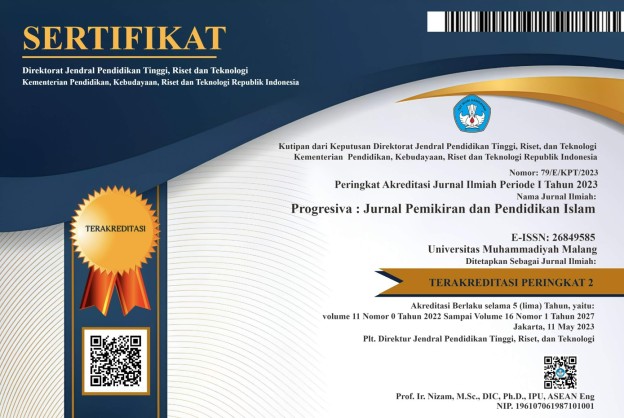Islamic Reform and Intellectual Accountability: Insights from the Life of Jamal Al-Din Al-Qasimi
DOI:
https://doi.org/10.22219/progresiva.v13i03.38094Keywords:
Al-Qasimi, Ideology, Intellectual Accountability, Islamic ReformAbstract
This article explored the life, ideas, and reforming methods of the renowned Syrian scholar Jamal Al-Din Al-Qasimi (1854–1914), whose substantial publications and thoughtful contributions had a profound impact on the Islamic world. During the 19th and early 20th centuries, when there was a great deal of intellectual and sociopolitical change, al-Qasimi was a prominent reformist thinker. He became a prominent voice in the fight against stagnation in Muslim society and for the revival of Islamic philosophy after being born in Damascus, Syria. As he tackled modern issues including the effects of colonialism, internal sectarianism, and intellectual decline, his scholarly pursuits were distinguished by an unshakeable dedication to maintaining the integrity of Islamic teachings. This work examines Al-Qasimi's influence on reformist philosophy using a historical analysis methodology, paying special attention to his social and intellectual activities. His involvement in important historical challenges, both literal and symbolic, that put his fortitude as a reformer to the test are highlighted in particular. The hallmark of his reformist legacy is his capacity to remain intellectually balanced in the face of divisive subjects. As to the findings, Al-Qasimi was a key player in tackling the issues of his time because of his thoughtful intellectual stance, support for an awakening of fundamental Islamic values, and stress on reason and critical thinking. Islamic philosophy is still influenced by his legacy in discussions about intellectual responsibility and reform. The extending significance of his approaches in managing the challenges of modernity is highlighted by this study.
Downloads
References
Al-Rasheed, M. (2013). A Most Masculine State Gender, Politics, and Religion in Saudi Arabia (C. Tripp (ed.); 1st ed.). Cambridge University Press.
Commins, D. D. (1990). Islamic Reform: Politics and Social Change in Late Ottoman Syria. In Oxford University Press. Oxford University Press.
Coppens, P. (2021). The ‘Muǧtahids’ Incident’ According to al-Qāsimī’s Memoirs. Iǧtihād et Taqlīd Dans l’islam Sunnite et Šīʿite, 36. https://journals.openedition.org/mideo/6766
Dudoignon, S. A., Hisao, K., & Yasushi, K. (2006). Intellectuals in the Modern Islamic World Transmission, Transformation and Communication (1st ed.). Imprint Routledge.
Fauzi, A., & Liza, F. (2024). An Analysis of Ibn Taimmiyah’s Hijā’ in Qasīdah Lāmiyah as the Identity of the Mahdzab Hambali. Tanwir Arabiyyah: Arabic as Foreign Language Journal, 4(1), 93–112. https://doi.org/10.31869/aflj.v4i1.5525
Hanieh, H. A. (2011). Susm and Su Orders: God’s Spiritual Paths Adaptation and Renewal in the Context of Modernization. Friedrich Ebert Stiftung Amman Ofce.
Harmidi, M. H., Kasim, T. S. A. T., & Yussuf, A. (2024). Scholarship of Syekh Jamaluddin Al-Qasimi (1282 H-1332 H) In Education. AL-AFKAR: Journal for Islamic Studies, 7(2), 149–164. https://doi.org/10.31943/afkarjournal.v7i2.1193
Hashem, M. (2023). Maqāṣid Al-Sharīʿah : A Civilizational Perspective. The International Institute of Islamic Thought.
Hovorun, C. (2016). Ideology and Religion. Kyiv-Mohyla Humanities Journal, 3. https://doi.org/10.18523/kmhj73933.2016-3.23-35
Islam, N. U. (2023). Peace and Conflict Resolution in Islam: A Perspective Building. Indonesian Journal of Interdisciplinary Islamic Studies (IJIIS), 6(2), 127–152. https://doi.org/10.20885/ijiis.vol6.iss2.art2
Kurzman, C. (2002). Modernist Islam 1840-1940: A Sourcebook. Oxford University Press.
Meri, J. W. (2006). Medieval Islamic Civilization: An Encyclopedia (J. L. Bacharach (ed.)). Routledge.
Nasr, S. H. (1987). Islamic Spirituality Foundations. Routledge.
Rubaidi, R., Hilmy, M., Mas’ud, A., & Basyir, K. (2023). Resisting the Surge of Salafism among Malay and Javanese Muslims: The Dynamics of the Tarekat Naqshbandiya and Qadiriya wa Naqshbandiya in Promoting Peaceful Islam in Riau Sumatera. Teosofi: Jurnal Tasawuf Dan Pemikiran Islam, 13(1), 1–31. https://doi.org/10.15642/teosofi.2023.13.1.1-31
Saeffudin, M., Muhib, & Andrisnurita. (2023). Jamaluddin Al-Qasimi’s Manhaj in the Application of the Science of Al-Jarh Wa Al-Ta’dil. Al-Hikmah:Jurnal Studi Keislaman, 13(2), 1–10. https://doi.org/10.36835/hjsk.v13i02.4035
Published
How to Cite
Issue
Section
License
Copyright (c) 2024 Khadeja Soude

This work is licensed under a Creative Commons Attribution-ShareAlike 4.0 International License.

















